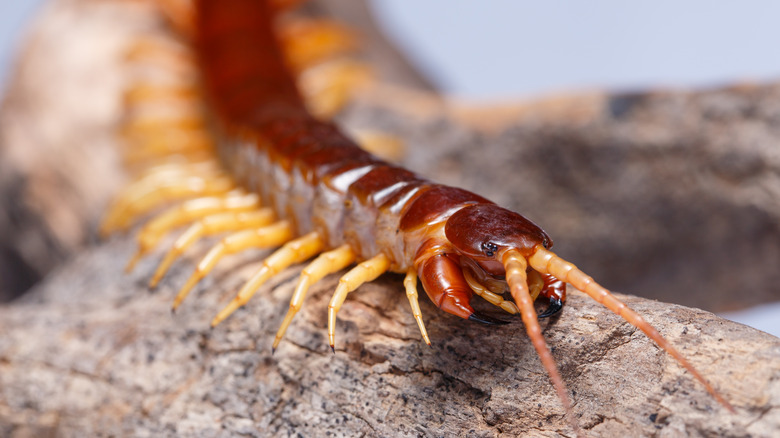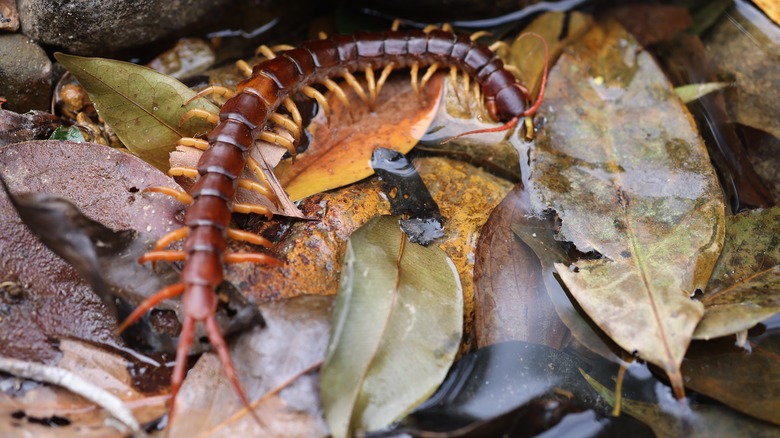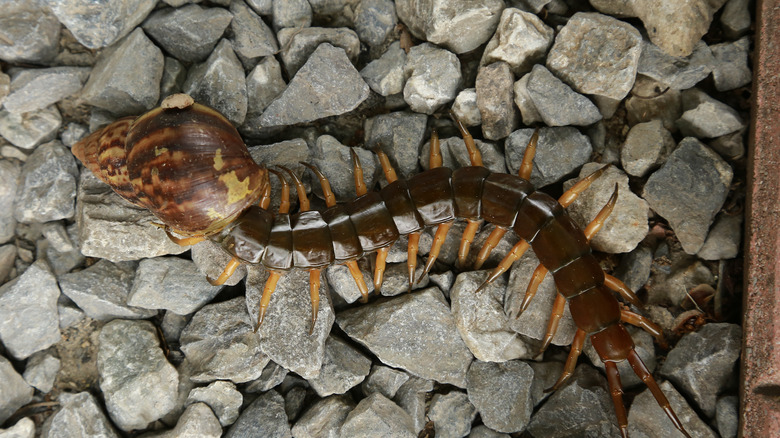Easy Ways To Attract Centipedes To Your Garden (& Why You Want Them There)
If you didn't say the word, "Ew," aloud as you read this headline, you most likely felt at least a hint of disgust when you pictured this pincer-wielding, multi legged creature. Centipedes are arthropods rather than insects, and they are among the good bugs that'll chase pests from your garden. These carnivorous, moisture-loving arthropods chomp down bugs with glee. In the garden, these unattractive beasts help us get rid of insects that challenge our efforts. You can lure these interesting arthropods in with methods that keep soil moist. Give them some amenities, like pots to crawl under and a damp layer of mulch, and the centipedes will stick around for years.
Centipedes are part of the Chilopoda class, and all of these bugs will gladly eat insects, spiders, worms, and other arthropods. Don't confuse them with another creature also referred to as the garden centipede, the garden symphylan, who does find your seedlings delectable. You'll know you have beneficial centipedes if they are brown in color instead of white like the garden symphylan. While they universally make people's skin crawl, having them crawl into your garden isn't a bad thing. Just maybe don't look at them while they do their work.
Keep it dark and damp for centipedes
Moisture-loving centipedes love tucking into cool and dark spots in your garden. They like to live under things like logs, pots, bricks or rocks where the soil stays moist. Centipedes don't make their own holes to live in, instead shacking up in holes already created by other creatures or simply beneath living or dead foliage. Centipede-friendly gardens will have places to hide, like mulch or decorative items like pavers or pots. There are pros and cons to using wood bark as mulch in your garden, but wood bark's moisture-holding power may be great for fostering a Chilopoda population.
The UK's Kew Royal Botanic Gardens suggests setting up a wood pile near your garden beds where centipedes will feel comfortable. They also mention that centipedes will thrive under a layer of dead leaves, which is also a great garden mulch. Not only will the centipedes love the cool, dark nooks and crannies in mulch, the layer of material will hold in water that's essential for your plants.
Why we want centipedes as neighbors
While we don't often rejoice seeing them skittering into dark basement corners, you will be happy to see centipedes in the garden. They act as sentinels for your plants, since they have a particular taste for some of the worst garden pests that you'll want to banish from your yard immediately. They'll gobble up pesky aphids, beetles, slugs, and snails. These bugs are some of the most reviled vegetable and flower-eaters. For cole crops like cabbage and brussels sprouts that are aphid magnets, a community of feasting centipedes can make a bit of a dent in an aphid infestation. Centipedes scurrying among lettuce leaves can also keep snails at bay. Plus, centipedes have an appetite for types of beetles that threaten many food and flower crops.
As if having them as an organic pesticide among your plants wasn't enough, they also play a role in decomposition by helping distribute organic material throughout the soil. Centipedes aren't technically decomposers, since they don't feed on dead organic matter or feces; however, they are considered part of the decomposer family because they help break up decaying soil material. Decomposers are vital for healthy soils by helping make nutrients more readily available for plants.


